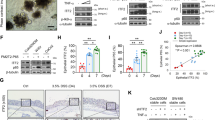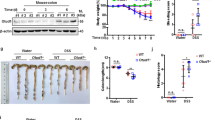Abstract
Background
The NF-κB signaling cascade regulates immune response and is often dysregulated in tumor development. UBE2W is a novel type I ubiquitin-conjugating enzyme (E2) whose biological function is still unclear.
Aims
This study was designed to investigate whether UBE2W regulates NF-κB signaling pathway and is involved in the progression of experimental colitis.
Methods
At the cellular level, the effect of UBE2W on NF-κB transcriptional activity was measured using a dual-luciferase reporter assay. The influence of UBE2W on NF-κB pathway activation and the entry of p65 into the nucleus were determined by Western blot and immunofluorescence analyses, respectively. Moreover, the colitis model was established by administering 2.5% dextran sulfate sodium (DSS)/water to UBE2W overexpression, UBE2W-knockdown and control mice. Body weight, stool consistency, colon length and clinical severity were examined. Expression of pro-inflammatory cytokines and phosphorylation of p65 and IκB in the colon tissue were measured by qRT-PCR and Western blot, respectively.
Results
UBE2W inhibited TNFα-induced NF-κB transcription activity, attenuated IκB and p65 phosphorylation, downregulated TNFα and IL-8 expression and blocked the entry of p65 into the nucleus. In the DSS-induced colitis model, UBE2W-knockdown mice had increased weight loss, more serious diarrhea and mucosal injures compared with the control mice. Moreover, phosphorylation of IκB and p65 and the expression of pro-inflammatory mediators such as TNFα, IL-6 were significantly increased in UBE2W knockdown mice. However, these changes were completely reversed in UBE2W overexpression mice.
Conclusions
The overexpression of UBE2W ameliorates the severity of DSS-induced colitis, which may be mediated by inhibiting the expression of pro-inflammatory mediators and activation of the NF-κB signaling pathway. These findings provide evidence that UBE2W might have potential therapeutic implications in IBD.





Similar content being viewed by others
Abbreviations
- UBE2W:
-
Ubiquitin-conjugating enzyme E2W
- DDS:
-
Dextran sulfate sodium
- NF-κB:
-
Nuclear factor-κB
- TNFα:
-
Tumor necrosis factor α
- IL-6:
-
Interleukin-6
- COX2:
-
Cyclooxygenase-2
References
Mitchell S, Vargas J, Hoffmann A. Signaling via the NFkappaB system. Wiley Interdiscip Rev Syst Biol Med. 2016;8:227–241.
Tilborghs S, Corthouts J, Verhoeven Y et al. The role of nuclear factor-kappa B signaling in human cervical cancer. Crit Rev Oncol Hematol. 2017;120:141–150.
Ghosh S, Dass JFP. Study of pathway cross-talk interactions with NF-kappaB leading to its activation via ubiquitination or phosphorylation: a brief review. Gene. 2016;584:97–109.
Aksentijevich I, Zhou Q. NF-kappaB pathway in autoinflammatory diseases: dysregulation of protein modifications by ubiquitin defines a new category of autoinflammatory diseases. Front Immunol. 2017;8:399.
Christensen DE, Brzovic PS, Klevit RE. E2-BRCA1 RING interactions dictate synthesis of mono- or specific polyubiquitin chain linkages. Nat Struct Mol Biol. 2007;14:941–948.
Zeng L, Tan J, Xue M et al. An engineering probiotic producing defensin-5 ameliorating dextran sodium sulfate-induced mice colitis via Inhibiting NF-kB pathway. J Transl Med. 2020;18:107.
Kim SW, Kim HM, Yang KM et al. Bifidobacterium lactis inhibits NF-kappaB in intestinal epithelial cells and prevents acute colitis and colitis-associated colon cancer in mice. Inflamm Bowel Dis. 2010;16:1514–1525.
Wirtz S, Neufert C, Weigmann B et al. Chemically induced mouse models of intestinal inflammation. Nat Protoc. 2007;2:541–546.
Farooq SM, Stadnyk AW. Neutrophil infiltration of the colon is independent of the FPR1 yet FPR1 deficient mice show differential susceptibilities to acute versus chronic induced colitis. Dig Dis Sci. 2012;57:1802–1812. https://doi.org/10.1007/s10620-012-2082-y
Farooq SM, Stillie R, Svensson M et al. Therapeutic effect of blocking CXCR2 on neutrophil recruitment and dextran sodium sulfate-induced colitis. J Pharmacol Exp Ther. 2009;329:123–129.
Zaki MH, Vogel P, Malireddi RK et al. The NOD-like receptor NLRP12 attenuates colon inflammation and tumorigenesis. Cancer Cell. 2011;20:649–660.
Maeda S, Hsu LC, Liu H et al. Nod2 mutation in Crohn’s disease potentiates NF-kappaB activity and IL-1beta processing. Science. 2005;307:734–738.
Tan B, Mu R, Chang Y et al. RNF4 negatively regulates NF-kappaB signaling by down-regulating TAB2. FEBS Lett. 2015;589:2850–2858.
Pan JX. LncRNA H19 promotes atherosclerosis by regulating MAPK and NF-kB signaling pathway. Eur Rev Med Pharmacol Sci. 2017;21:322–328.
Demchenko YN, Kuehl WM. A critical role for the NFkB pathway in multiple myeloma. Oncotarget. 2010;1:59–68.
Wang S, Lin Y, Yuan X et al. REV-ERBalpha integrates colon clock with experimental colitis through regulation of NF-kappaB/NLRP3 axis. Nat Commun. 2018;9:4246.
Edelblum KL, Washington MK, Koyama T et al. Raf protects against colitis by promoting mouse colon epithelial cell survival through NF-kappaB. Gastroenterology. 2008;135:539–551.
Lee CY, Lai TY, Tsai MK et al. The ubiquitin ligase ZNRF1 promotes caveolin-1 ubiquitination and degradation to modulate inflammation. Nat Commun. 2017;8:15502.
Zhang Y, Zhu H, Zhao L et al. [Generation of mouse UBE2W antibody and analysis of UBE2W expression in mouse tissues. Sheng Wu Gong Cheng Xue Bao. 2008;24:547–552.
Yin G, Ji C, Wu T et al. Cloning, characterization and subcellular localization of a gene encoding a human ubiquitin-conjugating enzyme (E2) homologous to the Arabidopsis thaliana UBC-16 gene product. Front Biosci. 2006;11:1500–1507.
Soss SE, Rose KL, Hill S et al. Biochemical and proteomic analysis of ubiquitination of Hsc70 and Hsp70 by the E3 Ligase CHIP. PLoS One. 2015;10:e0128240.
Scaglione KM, Zavodszky E, Todi SV et al. Ube2w and ataxin-3 coordinately regulate the ubiquitin ligase CHIP. Mol Cell. 2011;43:599–612.
Zhang Y, Zhou X, Zhao L et al. UBE2W interacts with FANCL and regulates the monoubiquitination of Fanconi anemia protein FANCD2. Mol Cells. 2011;31:113–122.
Vittal V, Wenzel DM, Brzovic PS et al. Biochemical and structural characterization of the ubiquitin-conjugating enzyme UBE2W reveals the formation of a noncovalent homodimer. Cell Biochem Biophys. 2013;67:103–110.
Tatham MH, Plechanovova A, Jaffray EG et al. Ube2W conjugates ubiquitin to alpha-amino groups of protein N-termini. Biochem J. 2013;453:137–145.
Hoffmann M, Schwertassek U, Seydel A et al. A refined and translationally relevant model of chronic DSS colitis in BALB/c mice. Lab Anim. 2018;52:240–252.
Gong Z, Zhao S, Zhou J et al. Curcumin alleviates DSS-induced colitis via inhibiting NLRP3 inflammsome activation and IL-1beta production. Mol Immunol. 2018;104:11–19.
Pichai MV, Ferguson LR. Potential prospects of nanomedicine for targeted therapeutics in inflammatory bowel diseases. World J Gastroenterol. 2012;18:2895–2901.
Ramakrishnan SK, Zhang H, Ma X et al. Intestinal non-canonical NFkappaB signaling shapes the local and systemic immune response. Nat Commun. 2019;10:660.
Shi Y, Guo Y, Zhou J et al. Herbs-partitioned moxibustion improves intestinal epithelial tight junctions by upregulating A20 expression in a mouse model of Crohn’s disease. Biomed Pharmacother. 2019;118:109149.
Chen W, Chen W, Zhu J, Chen N, Lu Y. Potent anti-inflammatory activity of tetramethylpyrazine is mediated through suppression of NF-k. Iran J Pharm Res. 2016;15:197–204.
Kondylis V, Kumari S, Vlantis K, Pasparakis M. The interplay of IKK, NF-kappaB and RIPK1 signaling in the regulation of cell death, tissue homeostasis and inflammation. Immunol Rev. 2017;277:113–127.
Lei B, Xie L, Zhang S et al. UBE2W down-regulation promotes cell apoptosis and correlates with hypospermatogenesis. Andrologia. 2020;52:e13474.
Acknowledgments
We thank Pro. HuiYan Li of the National Biomedical Analysis Center for this project guidance.
Funding
This work was supported by grants from National Natural Science Foundation of China (Nos.31600624).
Author information
Authors and Affiliations
Corresponding author
Ethics declarations
Conflict of interest
All authors declare that they have no competing interests.
Additional information
Publisher's Note
Springer Nature remains neutral with regard to jurisdictional claims in published maps and institutional affiliations.
Supplementary Information
Below is the link to the electronic supplementary material.
Rights and permissions
About this article
Cite this article
Wang, S., Pu, J., Li, X. et al. UBE2W Improves the Experimental Colitis by Inhibiting the NF-κB Signaling Pathway. Dig Dis Sci 67, 5529–5539 (2022). https://doi.org/10.1007/s10620-022-07453-4
Received:
Accepted:
Published:
Issue Date:
DOI: https://doi.org/10.1007/s10620-022-07453-4




